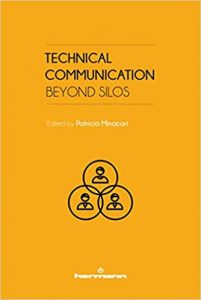Références
Patricia MINACORI, dir., Technical Communication: Beyond Silos, Paris: Herman Éditeurs, 2019, 118 + 9, ISBN 979-1037002754, 25€.

Texte
Technical communication as a profession has long been tasked with translating and transmitting information created by technical experts so that it can be implemented by end users. As a result, breaking down information silos within and between organizations is an intuitive research fit for scholars of technical communication. Several interconnected themes emerge from Technical Communication: Beyond Silos, including: deconstructing hierarchies, building a culture of trust based on shared goals, and the importance of the iterative process.
Deconstructing Hierarchies
The authors contextualize the importance of deconstructing hierarchies, both between students and teachers, but also between academics and practitioners. Stanton and Gunning both write about the way that service learning can provide a pedagogical framework that moves beyond the student-teacher relationship and the pseudotransactionality that characterizes many student-teacher relationships. Duin, Tam and Moses similarly assert in chapter 3 that design thinking, a process that begins with empathy and a deep understanding of the challenge that the team is facing, allows for radical collaboration that allows teams to connect silos.
Mogull claims in chapter 4 that an organization’s hierarchical structures can be the source of ineffective collaboration between team members. Employee motivation is driven by autonomy, mastery and purpose, and breaking the hierarchical layers down can increase employee engagement, which can in turn encourage people to learn and evolve in their roles.
Bischoff states in chapter 5 that silos between hierarchical layers can be dissolved by empowering teams to make decisions and take responsibility as a team, rather than leaving all of the decision-making process in the hands of a select few. Softening rigid hierarchical structures can strengthen an organization.
Building a Culture of Trust
Bischoff argues that if an organization wants to build a culture that breaks down workplace silos, it must foster a culture of trust that is based on shared knowledge where team members believe that they are working toward shared goals and group growth. Gunning establishes in chapter 2 that critical listening skills are essential in building a culture of trust and defines critical listening as “ensuring that we are hearing our client’s intentions clearly, correctly, and in their entirety” (p. 32). Gunning notes that using live streaming programs, like Zoom can assist with this process, as they allow participants to record calls, which can facilitate critical listening by allowing team members to review recordings of meetings. The teams who were successful in creating usable deliverables were those who practiced critical listening.
Shared goals
Stanton notes in chapter 1 that shared goals and expectations are essential to the success of student projects. Gunning also addresses the importance of shared expectations by discussing the challenge of orienting students to the expectations of the client and contends that reciprocity can help with this. “A student team does not produce a deliverable without gaining knowledge about collaborative writing, and the organization does not benefit from a deliverable without helping the student team practice their communication skills and project management strategies” (p. 35). Bischoff grounds her discussion of breaking silos by discussing the importance of cross-functional teams, defining them as groups composed of individuals from different departments with different competencies, allowing them to combine their skill sets. Mogull illustrates the importance of shared goals to breaking down silos in chapter 4 by discussing scenarios where team members had differing levels of personal investment in the success of their product. Gallon echoes this importance in chapter 6, saying that for teams to function successfully, all members “must consider themselves 100% responsible” (p. 102).
Importance of Iterative Processes
The importance of iterative processes, or using multiple rounds of analysis to update a document or process, is a recurring theme among the authors. Gunning posits that engaging students in iterative reviews of their experiences as a team helps them to build critical thinking skills. Duin, Tham, and Moses emphasize the iterative nature of design thinking and connect it with methods like Scrum, which is frequently used in IT environments. Gallon reminds readers that information can change rapidly as we move toward a fourth industrial revolution, and we must consider how we pursue our iterative processes. The iterative process takes a somewhat different format for students in service-learning classes. Stanton describes ongoing discussions with her graduate students about the author/editor relationship, audience adaptation, client-based editing and professional ethics over the course of the semester. Gunning discusses iterative processes, both from her role as instructor and guide to her students, as well as from an instructional design perspective.
Conclusion
Minacori reminds us that “technical communication touches on many types of expertise, including engineering, training, support, user experience, marketing, translation, and change management” (p. 6). This text would be of particular interest to graduate students who want to build an understanding of both the discourse of the discipline and the practical applications of some of the theoretical concepts in the discipline. Teachers will find useful guidance for incorporating service learning into their pedagogy. Practitioners will find inspiration for less hierarchical and more democratic organizational structures in the workplace.
Auteurs
Shannon SAMSON, Texas Tech University, Department of English
Shannon.Samson @ ttu.edu
Références
Pour citer cet article :
Shannon SAMSON - "Patricia MINACORI, dir., Technical Communication: Beyond Silos" RILEA | 2022, mis en ligne le 24/05/2022. URL : https://anlea.org/revues_rilea/minacori-patricia-ed-technical-communication-beyond-silos/